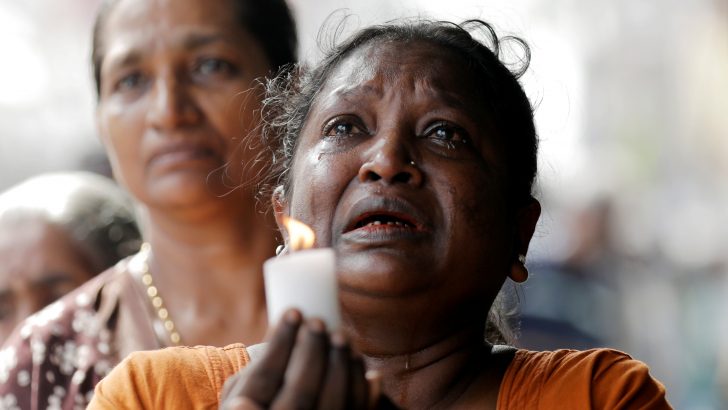Sri Lanka’s top Catholic has called for an independent inquiry into a series of bombings that shook the country on Easter Sunday, saying investigations conducted until now have been swayed by political interests.
Cardinal Malcolm Ranjith, the archbishop of Colombo, said that for Sri Lankans, a parliamentary probe into the attacks “is biased because it is done by parliamentarians of different political parties, they are not independent of their positions”.
“We want a completely independent, impartial, apolitical group to investigate this…and to find out who planned this, who did this, why certain aspects of warning were not taken seriously and so on,” he said.
On April 23, seven suicide bombers from the local Muslim group ‘National Thowheed Jamath’ attacked three churches and three luxury hotels, killing 263 people and injuring hundreds of others in the deadliest Islamic State-linked attack in South Asia.
In the wake of the attacks, it became known that Sri Lankan security officials had received near-specific intelligence on possible attacks on churches several weeks before the bombings, and government leaders have admitted that certain intelligence units had been aware that attacks might take place.
Since then, government leaders and security personnel have come under heavy criticism. Sri Lankan President Maithripala Sirisena insisted that he was not informed of this intelligence and he later appointed a 3-member presidential commission to investigate the attack.
Sri Lanka’s national police chief Pujith Jayasundara was suspended after the bombings, and Defence Secretary Hemasiri Fernando resigned from his post. The two were eventually arrested when the presidential commission established grounds to charge them with dereliction of duty and criminal negligence, however, they were later released on bail.
Commission
The presidential commission has also recommended disciplinary action against nine senior police officers for failing to prevent and minimising the attack.
In a separate move, a parliamentary committee has been independently investigating the intelligence failures, despite objections from Sirisena.
Cardinal Ranjith said the initial inquiry was done in a rush, with just 2-3 weeks to prepare a report. “That’s not enough time for them to delve into all the aspects of the case,” he said, insisting that the report offered an undetailed overview, and “we do not have much confidence in that”.
In an August 13 statement following their recent plenary assembly, the bishops of Sri Lanka said they were “saddened” that their repeated request for an independent inquiry has not yet taken place.
“We observe that several committees have been established and their main focus appears to be to find out those responsible for the serious lapses in security,” the bishops said.
However, while these efforts are “useful”, they insisted that as a “matter of justice” the main goal of such inquiries ought to be ascertaining “who the perpetrators are and who aided and abetted in any way in these dastardly acts”.
“Unfortunately, we do not see any positive signs in this direction,” they said, noting that a report conducted by the presidential commission “is yet to see the light of day”.
With the government’s failure to provide answers and assurances, fear and uncertainty are still prevalent in Sri Lankan society, they said, and they praised the efforts made by the country’s police and armed forces for their help in keeping things going in the midst of what they called a “gloomy situation”.
“We urge once again the government and all political leaders of the country to ensure an independent and impartial inquiry as a matter of utmost urgency,” the bishops said, insisting that in the pursuit of justice, “all partisan considerations such as ethnicity, religion or any other factor should be shunned”.
Cardinal Ranjith said another reason for insisting on the inquiry is that the bishops do not want investigations to slip through the cracks going into the country’s presidential elections, which the Constitution says must take place between November 9 – December 9.
Preparations
“Among the victims and those who suffered the consequences of the bombing attacks, and also in the general population of the country, there is a feeling that in light of the preparations going on for the election of the new president of Sri Lanka, there is a tendency to forget and to make recede into the background what happened on Easter Sunday,” he said.
The people, he said, “fear that therefore the truth will not be known, so they want to know, people want to know what really happened, who was behind this and what were the other forces that should have been investigated. They want to know the truth”.
Cardinal Ranjith said Sri Lankan Prime Minister Ranil Wickremesinghe has already contacted him and “expressed openness” to the idea. He said he also plans to write to Sirisena voicing the bishops’ desire for an independent commission to be established and asking him to do it.
“We hope that this request will be fulfilled,” he said.
Elise Harris is Senior Correspondent of Cruxnow.com


 A woman weeps during a memorial service for victims in Colombo, Sri Lanka.
Photo: CNS
A woman weeps during a memorial service for victims in Colombo, Sri Lanka.
Photo: CNS 